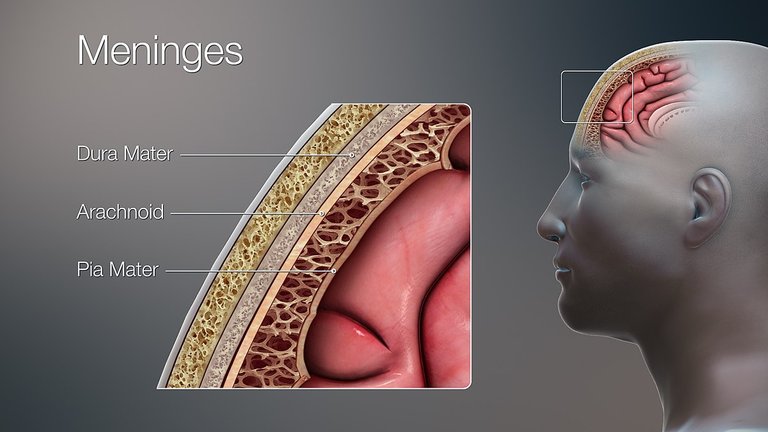There are three membranes surrounding the central nervous system, which include the brain and spinal cord.

By scientific animations - www.scientificanimations.com, CC BY-SA 4.0 Wikimedia
They are the pia, dura and arachnoid matter. These membranes called the meninges protect the central nervous system from damage or harm.
In meningitis, these membranes are inflammed, and compromised, causing various effects.
The most common causes of meningitis are bacteria and virus. However, it can also be caused by fungi, cancer and tuberculosis.
BACTERIAL MENINGITIS
It is often caused by bacteria, and can be fatal if left untreated.
About 1 in 10 people who get bacterial meningitis die, and 1 in 5 get serious complications.
Bacteria causing meningitis include:
- Streptococcus pneumonia: usually found in respiratory tract. Causes pneumococcal meningitis.
- Neisseria meningitidis: it is spread through saliva and other respiratory fluids. Causes meningococcal meningitis.
- Staphylococcus aureus: found all over the skin. Causes staphylococcal meningitis.
- Listeria monocytogenes.
A bacteria called Haemophilus influenzae was responsible for meningitis in babies and young children until a vaccine was made available.
In many cases, bacterial meningitis starts when bacteria get into the bloodstream from the sinuses, ears, or throat. The bacteria travels through the bloodstream to the brain.
It is also very contagious.
VIRAL MENINGITIS
It is more common and less serious than bacterial meningitis.
Viral meningitis usually begins with symptoms of a viral infection, such as fever, or body weakness.
Later, the person develops a headache and stiff neck.
Doctors suspect viral meningitis based on symptoms and do a spinal tap (lumbar puncture) to confirm the diagnosis.
Virus in the enterovirus category cause about 52 percent of the cases in adults and they include:
- Coxsacklevirus A
- Coxsacklevirus B
- Echoviruses
Other viruses that cause meningitis include:
- HIV
- Herpes virus
- Measles
- Mumps
FUNGAL MENINGITIS
Fungal meningitis is a rare type of meningitis. It’s caused by a fungus that infects the body and then spreads from the bloodstream to the brain or spinal cord.
People with a weakened immune system are more likely to develop fungal meningitis. This includes people with cancer or HIV.
The most common fungi causing meningitis include:
- Cryptococcus: is inhaled from dirt or soil that is contaminated with bird droppings.
- Blastomyces: fungus also found in the soil.
- Histoplasma: found in environments contaminated with bat and bird droppings.
- Candida and Coccidioides also cause fungal meningitis.
Although it can be very severe, it is not common and also not contagious. But like bacterial meningitis can cause outbreaks such as the highly publicized one that occurred in 2012, when steroid injections contaminated with the fungus Exserohilum rostratum resulted in more than 50 deaths and approximately 700 illnesses across the country.
NON-INFECTIOUS MENINGITIS
It is a type of meningitis not caused by an infection, rather other conditions like:
- Lupus
- Medications
- Cancer
- Tuberculosis
SYMPTOMS OF MENINGITIS
The most common signs you'll see in a person with meningitis are:
- Headache
- Fever
- Neck stiffness
However, other symptoms exist. They include:
- Altered mental status
- Seizures
- Lethargy
- Nausea and vomiting
- Sensitivity to light
TREATMENT
Treatment of meningitis is based on the cause.
Bacterial meningitis will be treated with antibiotics. Viral meningitis on the other hand, usually goes away on its own. However, if a virus like herpes or influenza caused the illness, you might take antiviral medication.
Fungal infections are also treated with antifungal drugs.
References
Healthline
Webmd
When I first read about meningitis closely affecting the fluid surrounding the brain and the spinal cord, I was thinking it could cause severe complications but reading that it could be cured with antibiotics, makes it sound less scary and better.